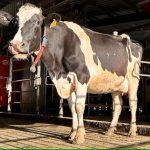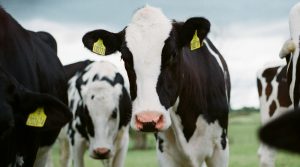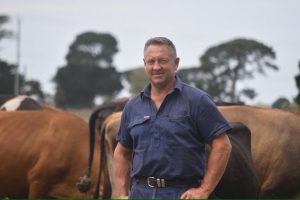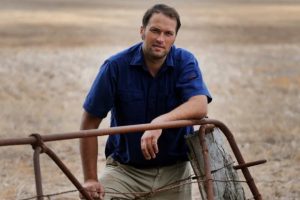
Paul Pouloudis has spent years selling fruit and vegetables at the same store his grandfather opened in 1939.
Faithful shoppers have kept coming through the same doors at the Tweed Fruit Exchange in Murwillumbah, less than an hour’s drive north from Byron Bay, even as bigger stores have come to town.
“We’re still a family-owned business employing local staff with lots of wonderful, regular customers,” the third-generation greengrocer said.
“We still get great community support. We feel very lucky in that way.”
On the other side of town, IGA owner Brett Bugg works with hundreds of local suppliers to make his supermarket stand out.
“That’s why a lot of customers come through our doors, because we are different,” he said.
While business is booming, it’s because locals don’t have much choice about where they shop.
IGA Murwillumbah owner Brett Bugg is proud to stock local produce. (ABC News: Kate Ainsworth)
“At the moment, there’s our two IGA supermarkets, and then we have a Coles,” Mr Bugg said.
“We have to compete with all our daily groceries, but what sets us apart is the little things that they don’t do.”
However, it’s not from a lack of interest. When the town’s former bowls club was put up for sale in 2014, Woolworths swooped in with plans to build a supermarket.
But 10 years later, the land is still vacant — and it’s one of more than 100 sites owned by the supermarket giant that’s being scrutinised by Australia’s competition watchdog as it cracks down on anti-competitive behaviour and land banking allegations levelled against Coles and Woolworths.
Murwillumbah locals can either shop at this IGA or the Coles supermarket on the other side of town. (ABC News: Kate Ainsworth)
‘They won’t do anything with the land’
Both Mr Pouloudis and Mr Bugg are quick to encourage competition in the local grocery retail space, but they share similar concerns about Woolworths coming to town.
It’s not the supermarket itself that’s the issue, they say, but rather the location — which explains why the site has been laying dormant for a decade.
In its former life as a bowls club, the land was only allowed to be used for private recreational purposes.
But for Woolworths to build a supermarket on the site, it would first have to gain the approval of the Tweed Shire Council to re-allocate the land for commercial purposes — a key part of the conditional offer it made to the site’s owners when it was put up for sale in 2014.
Woolworths has been in discussions for years about trying to build a supermarket here.
Woolworths lodged a planning proposal with the council in 2015, but despite it being approved by its town planners, councillors unanimously rejected the request to rezone the site.
State planning laws in New South Wales meant Woolworths was able to have the council’s decision reviewed by the broader Joint Regional Planning Panel later that same year, which also rejected the proposal.
Woolworths would go on to purchase the site from its owners for $2.5 million in 2018, but it’s still no closer to building a supermarket.
“To this day, it’s still zoned [for] private recreational purposes and commercial development is not currently permissible,” Denise Galle, Tweed Shire Council’s head of development and planning, said.
“If it came back to council now … it would involve again going out to the public, asking what their views are on it to see if the public supported that, and then our new elected council would be able to make a new decision based on all of the available information on hand.
“At the end of the day, this is a local council decision … that will be determined on its merits.”
Denise Galle is the director of planning and regulation at the Tweed Shire Council. (ABC News: Kate Ainsworth)
But in Mr Bugg’s view, the residents of Murwillumbah have already made their position clear.
“The council doesn’t want it there, the community doesn’t want it there, and even the state government doesn’t want it there,” Mr Bugg said.
“They’ve been knocked back twice but they keep persisting. They won’t go away. They won’t do anything with the land. It’s just sitting with a fence around it, idle.”
In a statement, Woolworths said it was committed to bringing a supermarket to Murwillumbah and remained engaged with the Tweed Shire Council.
“Our preference is to develop the land as quickly as possible once we have the planning approvals in place,” a Woolworths spokesperson said.
The vacant block of land is completely fenced off. (ABC News: Kate Ainsworth)
Land banking or business as usual?
The situation in Murwillumbah speaks to the broader complexities that the competition watchdog has found itself sifting through as it investigates Australia’s concentrated supermarket industry.
The Australian Competition and Consumer Commission’s (ACCC) interim report released in September identified 165 blocks of land that were potentially being hoarded by the major supermarkets.
The practice, known as “land banking”, refers to the strategic purchasing of sites by the supermarket giants to prevent their competitors from setting up shop.
Out of the 165 undeveloped sites, the ACCC says two-thirds — or 110 blocks of land in total — are held by Woolworths, with 42 owned by Coles and 13 by Aldi.
Asked why the supermarket giants were holding onto undeveloped sites at a Senate hearing on Friday, Woolworths chief commercial officer Paul Harker said not all of the sites were owned by the company.
“Of the 110 sites that were attributed to us, 46 sites are not actually owned by Woolworths, they’re actually owned by external developers,” he said.
Mr Harker told senators that 43 of the remaining 64 sites owned by Woolworths were “either built or in stages of planning and delivery”, four were “through the planning approvals process” and 17 were “in the process … to be able to accommodate a supermarket”.
Coles’ head of public affairs, Adam Fitzgibbons, said while “99 per cent” of its supermarket sites were leased, its 42 sites were at varying stages of development.
“A number of them are under construction, a few of them will be preparing and lodging development applications … a number of them are actually earmarked for sale, some are tenanted, and there are a number of sites where they’re undergoing amalgamation,” he said.
Both Woolworths and Coles have previously said the planning approvals and construction process can take upwards of five years before a new store can be opened.
While the ACCC is yet to determine whether land banking is occurring, it remarked separately that zoning and planning laws “may slow a supermarket retailer’s ability to develop new stores by creating additional costs or adding significant delays” — a comment that echoes the findings of its last grocery inquiry in 2008.
Aside from the IGA, Coles is the only other major supermarket in Murwillumbah. (ABC News: Kate Ainsworth)
‘We have to admit to a failure’
The ACCC’s final report into grocery prices in 2008 found that zoning and planning requirements acted as “an artificial barrier to new supermarkets being established” and had the “unintended consequence of potentially impacting competition between supermarkets”.
It specified that the “complexities of planning applications” gave the major supermarkets “the opportunity to ‘game’ the planning system to delay or prevent potential competitors entering”.
At the time, the ACCC recommended all levels of government consider how competition would be affected by zoning and planning decisions when concerning supermarkets.
Graeme Samuel, who was in charge of the competition watchdog during the inquiry, said the issues raised in the ACCC’s recent interim supermarket report proved not much had changed in 16 years.
“When we did our inquiry in 2008 … we met a real hurdle, and that was local governments and state governments and planning restrictions,” he said.
“I think town planning restrictions imposed primarily by local government, but sometimes taken over by state governments, is a major impediment to the entry of new competitors into markets, particularly in regional Australia, and that’s not fair.
“I tried to deal with this back in 2008 and 2009, and we have to admit to a failure and be able to address it. It’s an important, difficult issue.”
Graeme Samuel says planning restrictions are a major hurdle to boosting competition. (ABC News: Scott Preston)
Reforming planning and zoning rules is on the agenda for the federal government, with Treasurer Jim Chalmers announcing in September he would begin discussions with his state and territory counterparts to open up more sites for Coles and Woolworths’ competitors to enter the market.
The federal government also allocated $30 million to the ACCC to aid its investigation of land banking claims, and has since introduced new merger laws to parliament that would increase its power to scrutinise acquisitions.
“I wish Treasurer Jim Chalmers every luck in the world and great strength to his arm, but it’s going to be a very difficult issue dealing with town planning,” Professor Samuel said.
“The NIMBY, not in my backyard, process really operates with great effect in terms of local government, and that’s something I think that state governments will have to address if they want to see lower prices brought about by more competition.”
The ACCC will form a final view as to whether the major supermarkets are engaging in land banking when it delivers its final report in February.
However, Professor Samuel said it could already take action against the alleged behaviour as part of its governing Competition and Consumer Act.
“Section 45 and importantly section 46, it’s a new section which would allow the ACCC to say to Coles and Woolworths and anyone else that’s land banking for that matter, ‘You are engaging in anti-competitive conduct, and that is prohibited under the act, and we’d like to engage you in some persuasive cooperation to disgorge the land you’re not going to use,'” he said.
“In other words, use it or lose it.”
The empty block of land in Murwillumbah stretches down to the town’s levee wall. (ABC News: Kate Ainsworth)
The waiting game
Back in Murwillumbah, Mr Bugg is quietly optimistic that renewed scrutiny on the major supermarkets by the ACCC and state and federal governments will deliver change.
“I think everyone welcomes competition, and we would love to actually really try and compete at their level … we just don’t get a chance,” he said.
“If the government somehow can look at this land banking and maybe free up some options for independent grocers or other supermarkets to go into that land that they’re holding onto, I think Australia will be better.
Brett Bugg is all for increasing competition locally. (ABC News: Kate Ainsworth)
“Anything could be happening with that land right now, whether it be housing or other supermarkets to open up competition. Maybe there’s international supermarkets that could come here. We’d welcome all that.
“But why lock it up and keep it away from anyone to do any other business with?”
In the meantime, the future of Woolworths in town seems to be on hold — a situation Mr Pouloudis and his family business knows all too well.
“I don’t lose sleep over it,” he said.
“If they want to come to town, I can’t do much to stop it … you just hope you get enough community support to stay viable.”
Locals still pick up fresh produce at Paul Pouloudis’s shop even though there are other stores in town. (ABC News: Kate Ainsworth)
🇺🇸 eDairy News INGLÊS: https://whatsapp.com/channel/0029VaKsjzGDTkJyIN6hcP1K
























